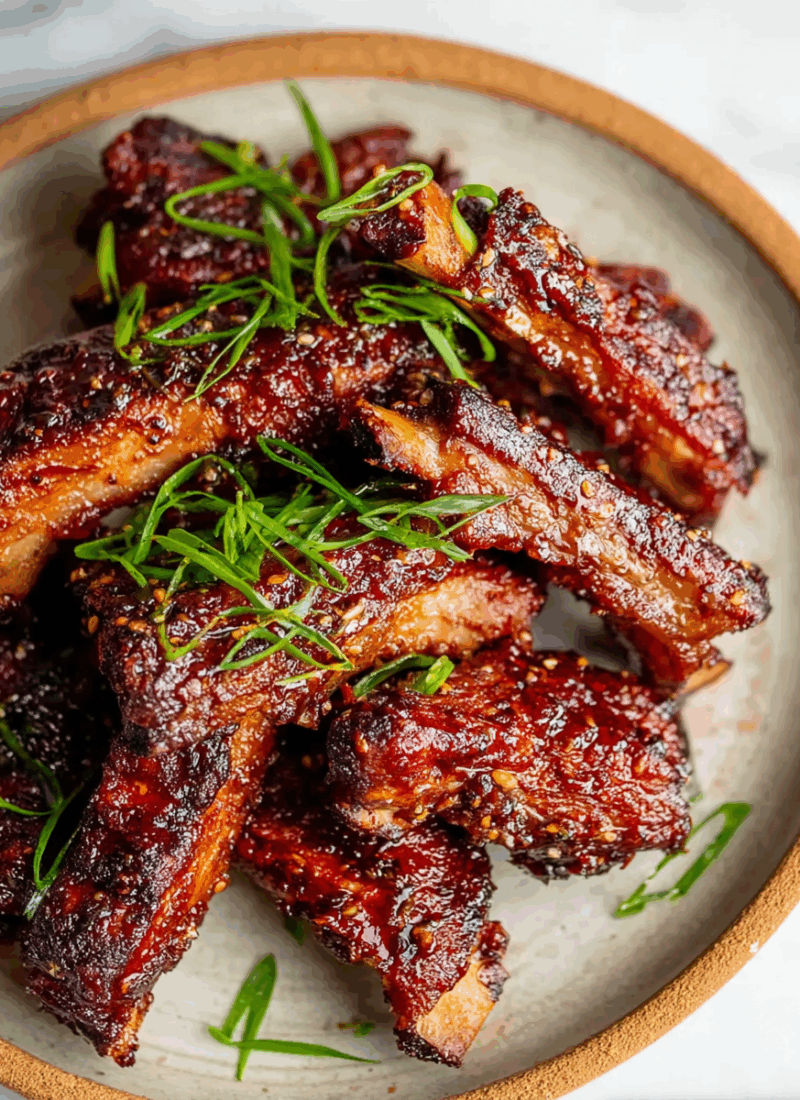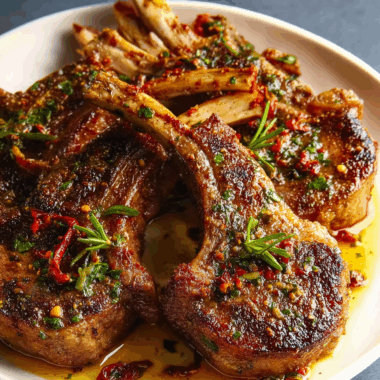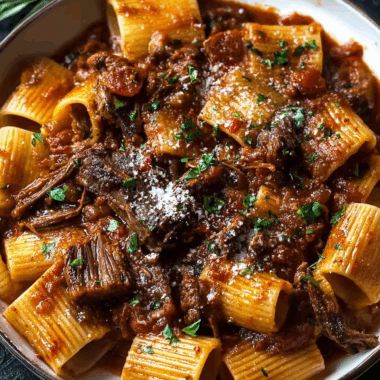These Korean-style spareribs are tender, sticky, sweet, and spicy. Infused with flavors from soy sauce, rice wine vinegar, mirin, gochujang (Korean chili paste), and honey, this dish is hard to resist. It pairs perfectly with rice, making it a great option for family meals or gatherings.
Full Recipe:
Ingredients
-
4 pounds pork spareribs, in serving-size pieces
-
1/3 cup soy sauce
-
3 tablespoons mirin
-
2 tablespoons rice wine vinegar
-
1/2 cup sugar
-
2 tablespoons honey
-
5 tablespoons gochujang (Korean chili pepper paste)
-
1 sweet onion, minced
-
5 cloves garlic, minced
-
3 slices peeled fresh ginger, minced
-
2 teaspoons sesame oil
-
3 to 4 scallions, thinly sliced and cut on a bias, for garnish
Directions
-
Prepare the Ribs:
In a large pot, bring water to a boil. Add the pork ribs and simmer for about 30 minutes. -
Marinate the Ribs:
Remove the ribs from the pot and place them into a shallow glass or ceramic dish. In a separate bowl, mix together the soy sauce, mirin, rice wine vinegar, sugar, honey, gochujang, onion, garlic, ginger, and sesame oil. Pour the marinade over the ribs, coating thoroughly. Turn the ribs over to ensure they’re evenly coated, then cover and marinate for at least 2 hours (or overnight for best flavor). -
Cook the Ribs:
Preheat your grill or oven. If using a grill, cook the ribs for 25-30 minutes, turning several times and basting with the marinade. If using an oven, bake at 375°F (190°C) for about 30 minutes, turning occasionally. -
Serve:
The ribs should be tender and slightly charred. Garnish with thinly sliced scallions and serve with rice.
Nutrients (Per Serving)
-
Calories: 658
-
Total Fat: 48g
-
Saturated Fat: 14g
-
Cholesterol: 159mg
-
Sodium: 901mg
-
Total Carbohydrates: 25g
-
Dietary Fiber: 1g
-
Total Sugars: 19g
-
-
Protein: 33g
-
Vitamin C: 5mg (24% of Daily Value)
-
Calcium: 48mg (4% of Daily Value)
-
Iron: 3mg (14% of Daily Value)
-
Potassium: 556mg (12% of Daily Value)
The Essential Ingredients in Korean-Style Spareribs
The foundation of Korean-style spareribs lies in the marinade, which is crafted from a harmonious blend of sweet, savory, and spicy elements. Soy sauce, mirin, and rice wine vinegar provide a deep umami flavor while balancing the sweetness of honey and sugar. The gochujang, or Korean chili paste, introduces a mild heat that complements the other ingredients perfectly, offering a distinct Korean flavor that is spicy but not overwhelming.
Aromatic additions like minced onion, garlic, and ginger lend an extra layer of depth, while sesame oil gives the marinade a fragrant, nutty finish. These ingredients together create a rich, sticky sauce that coats the ribs and enhances their flavor. The result is a sweet and spicy glaze that caramelizes beautifully when cooked, creating that signature sticky texture that makes these ribs so irresistible.
Preparing the Ribs
Before marinating, the pork spareribs need to be prepared. First, simmer the ribs in a large pot of boiling water for about 30 minutes. This initial step helps to tenderize the meat, ensuring it’s juicy and cooked through once grilled or baked. The simmering process also helps remove excess fat, making the ribs lighter and more tender.
Once the ribs are simmered, they are ready to absorb the delicious marinade. Removing the ribs from the pot and transferring them to a shallow glass or ceramic dish allows you to fully coat the ribs with the marinade. This step is crucial to infusing the meat with all the flavors of the soy sauce, mirin, honey, and gochujang.
Marinating the Ribs
Marinating the ribs is key to achieving the depth of flavor that makes this dish so special. In a separate bowl, combine the soy sauce, mirin, rice wine vinegar, sugar, honey, gochujang, onion, garlic, ginger, and sesame oil. This mixture creates a marinade that’s both rich and tangy, with the gochujang providing a gentle heat that isn’t overpowering.
Pour the marinade over the ribs and ensure they are fully coated. Turning the ribs over to coat both sides ensures even flavor distribution. Once the ribs are properly marinated, cover the dish and refrigerate for at least two hours. For best results, marinate the ribs overnight to allow the flavors to fully develop. The longer the ribs sit in the marinade, the more tender and flavorful they will become.
Cooking the Ribs
Once the ribs are marinated, it’s time to cook them. You can either grill the ribs or bake them in the oven. Both methods yield delicious results, though grilling gives the ribs a slightly smoky flavor that enhances the overall taste.
To grill the ribs, preheat your grill and cook the ribs for 25-30 minutes, turning them several times while basting with the marinade. Grilling allows the ribs to become charred and crispy on the outside while remaining tender and juicy on the inside. The marinade caramelizes as it cooks, creating a sticky coating that makes the ribs even more irresistible.
Alternatively, baking the ribs in the oven at 375°F (190°C) for about 30 minutes is a great option, especially during colder months when grilling may not be ideal. Turn the ribs occasionally to ensure they cook evenly. Whether grilled or baked, the ribs should be tender and slightly charred, with a beautiful glaze that is a perfect balance of sweetness and spice.
Garnishing and Serving the Ribs
The final touch to Korean-style spareribs is the garnish. Thinly sliced scallions, cut on a bias, add a fresh, crisp element that contrasts with the rich, sticky ribs. The green onions bring a mild onion flavor that brightens the dish and adds a pop of color to the presentation.
Serve the ribs with steamed rice, which acts as a perfect base for soaking up the delicious sauce. The rice helps balance the bold flavors of the ribs and provides a satisfying, hearty accompaniment. You can also serve the ribs with a side of vegetables, such as a simple cucumber salad, for added freshness.
Nutritional Value
Each serving of Korean-style spareribs is packed with protein, providing 33 grams per serving. The pork ribs also contribute a substantial amount of fat, with 48 grams of total fat, 14 grams of which are saturated fat. While the fat content may seem high, much of this comes from the rich flavor of the ribs, and it can be balanced with the vegetables and rice served alongside.
The dish also offers a good source of carbohydrates, with around 25 grams per serving, primarily from the rice. There’s a moderate amount of dietary fiber (1g), as well as sugars from the honey and sugar in the marinade (19g). The sodium content in this dish is quite significant, with around 901mg per serving, which can vary depending on the brand of soy and other sauces used.
The ribs provide 5 mg of Vitamin C, which is about 24% of the daily value, thanks to the garlic, ginger, and green onions. Additionally, each serving contains around 3 mg of iron, which is 14% of the daily value, offering a boost to your overall nutrition.
Why Korean-Style Spareribs Are Perfect for Family Meals
Korean-style spareribs are perfect for family meals or gatherings for several reasons. First, they are easy to prepare in large quantities, making them ideal for feeding a crowd. The ribs can be marinated in advance, reducing the time spent cooking and allowing for stress-free preparation when it’s time to serve.
Additionally, the sweet and spicy glaze is universally loved, making this dish a hit with both children and adults. The tender, flavorful ribs pair perfectly with rice, creating a balanced meal that everyone can enjoy. The dish’s versatility also allows you to adjust the level of spice and sweetness based on your preferences, making it customizable to suit different tastes.
Conclusion
Korean-style spareribs are a delicious and satisfying dish that combines sweet, savory, and spicy flavors in every bite. Whether grilled or baked, these tender ribs are coated in a sticky, glossy marinade that creates a mouthwatering glaze. Paired with rice and garnished with fresh scallions, this dish is perfect for family meals, gatherings, or any occasion where you want to impress with a flavorful, easy-to-make recipe. The balance of flavors, combined with the tender pork and rich marinade, makes these spareribs a standout dish that will surely become a favorite in your culinary repertoire.








